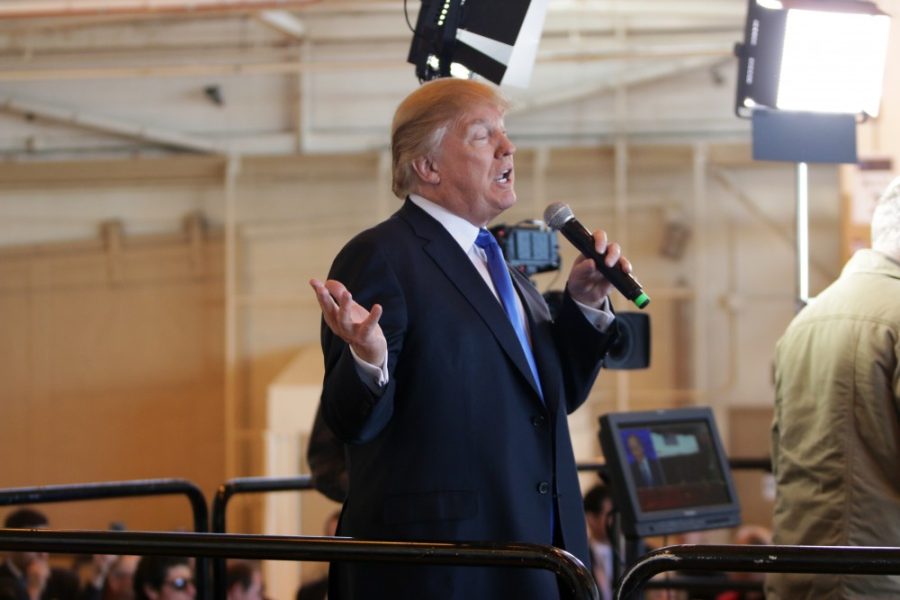A deeply divided Republican party must re-examine itself as Donald J. Trump walked away from Super Tuesday with seven victories leaving Ted Cruz with three and Marco Rubio with just his first victory in the primary election. On the other side of the aisle, Democrats begin to see what they expected all along: a consolidation of power behind Hillary Clinton.
Clinton’s haul on Tuesday included seven states and one territory, with the four biggest Democrat delegate offerings — Texas, Massachusetts, Georgia and Virginia.
Bernie Sanders did well for himself by earning victories in four states, the most sweeping of which occurred in his home state of Vermont. But some Democrats fear it is not enough to keep up with Clinton who has amassed 1,034 delegates to Sanders’ 408.
“I think that it may decrease the momentum of Sander’s campaign,” Joseline Mata, president of the UA Young Democrats, said of Tuesday’s results.
Mata said she had already spoken to some Democratic elected officials who were considering switching their support from Sanders to Clinton.
On the other side of the spectrum, the Republican party was wishing they were down to just two candidates, but it is unlikely Cruz or Rubio will let go after tasting victory on Tuesday.
Trump’s tone was noticeably calmer as he gave his victory speech in Palm Beach, Florida, where he cut down on his usual rhetoric and employed tones that seemed more moderate than normal.
This change came after a one-on-one interview between Melania Trump and CNN’s Anderson Cooper on Monday when Mrs. Trump shared that she does not always agree with her husband, especially in terms of his choice of language. She did, however, believe he was capable of a more moderate tone.
“To build the empire and the business that he did, you can’t always use that kind of tone,” Mrs. Trump said. “He could really change the words and the tone.”
Trump played it nice until he ominously mentioned Speaker Paul Ryan, saying Ryan is “going to have to pay a big price” if he doesn’t get along with Trump.
Gov. Chris Christie’s presence behind Trump on stage Tuesday added to the general election feel of Trump’s speech but the governor also stole some of the spotlight on social media.
Within minutes of the speech’s start, Chris Christie’s forlorn expression was trending on Twitter.
After #SuperTuesday victories, @ChrisChristie‘s face stole the show from @realDonaldTrump https://t.co/iV64m8HLF1 pic.twitter.com/zsVBswTseF
— CNN (@CNN) March 2, 2016
Christie had good reason to be sad Tuesday, after six New Jersey newspapers called for him to step down from his post as governor. Local paper, Asbury Park Press, stated in an editorial Tuesday morning that they were done with Christie’s arrogance, opportunism and hypocrisy.
“We’re fed up with his long neglect of the state to pursue his own selfish agenda,” Asbury Park Press editors wrote, citing that Gov. Christie spent 261 full or partial days out of the state last year.
Hillary Clinton’s victory speech was a little less drama-filled as she took aim at GOP front-runner Donald Trump.
“America never stopped being great,” Clinton said. “We have to make America whole … We have to make strong the broken places, re-stitch the bonds of trust an respect across our country.”
This idea of unifying the country is new for Clinton, who said in the Democratic debate in October that the enemy she was most proud of making was the GOP.
Trump referenced Clinton in his speech and said he did not know what making America whole again was all about because “great” sounded better than “whole.” He called himself a common sense conservative who could unify the nation, saying he had already expanded the Republican party.
Ashlee Bierworth, president of the UA College Republicans, did not feel that Trump was giving a fair assessment of the situation.
“I would not classify Donald Trump’s campaign as expanding the party,” Bierworth said, “I do think that he has played a role in generating a large amount of voter turnout and public attention to the presidential primary process.”
History has proven that candidates who do win on Super Tuesday go on to become their parties’ nominees, but it is worth noting that the scale of Super Tuesday was has fluctuated greatly in the past two election cycles.
The GOP competed for 21 states while the Democrats competed for 22 states and a territory in 2008. While in 2012, only 10 states were up for grabs.
Cruz won a crucial victory for his campaign by beating Trump out for Texas and picking up Alaska and Oklahoma along the way. He called for all non-Trump supporters to rally around him if they want to defeat Trump.
“America shouldn’t have a president whose words would make you embarrassed if your children repeated them,” Cruz said.
Rubio finally had his first win, sweeping Minnesota. However, he did not have a strong showing elsewhere and only came in second in three states. He is looking forward now to securing a victory in Florida.
The next bought of primary voting is on Saturday, March 5 with Kansas, Kentucky, Louisiana, Maine and Nebraska going to the polls.
Check out full live-tweet coverage in the Storify below:
Follow Michelle Jaquette on Twitter.









